A nation begins to die the moment it forgets who its enemies are, because identity is shaped not only by what we are, but by what we are willing to reject.
Carl Schmitt, the brilliant German jurist and political theorist, warned that all politics begins with distinction—the drawing of a line between friend and enemy, between those with whom we share fate and those who threaten our survival. To erase that line is not an act of progress or enlightenment, but an act of surrender, the first step in the dissolution of any real order.
Modern America has not merely blurred this distinction; it has abolished it. Under the guise of tolerance, equality, and procedural neutrality, the regime has made it unlawful, even unthinkable, to speak in the language of political existence. The foundational division upon which every true polity rests has been replaced with moral euphemism, bureaucratic drift, and an ethic of suicidal openness.
This is not a debate about policy or reform, and it is not a matter of partisan preference. It is a reckoning with what has been lost: not only borders and ballots, but also the deeper capacity to decide, to act, and to rule in defense of a people who still remember who they are.
Schmitt saw this with greater clarity than any liberal jurist or conservative statesman. The survival of a people begins with the will to draw a line, to know what is theirs, to speak its name aloud, and to defend it without apology.
For Schmitt, politics does not begin with compromise or consensus, but with conflict. It is not process, but decision. It is the moment when a people affirms itself by identifying what threatens it, when it distinguishes between those who belong and those who do not, between what must be preserved and what must be repelled.
In The Concept of the Political, he defined the political as rooted in the friend-enemy distinction, a distinction that is not rhetorical or symbolic, but existential. The enemy is not someone we simply disagree with, not a business rival or political opponent, but the one whose existence threatens our own, the one with whom we must be prepared to enter into physical conflict. The political begins with the recognition that peace is never guaranteed, that the line between coexistence and confrontation is never erased, only deferred. The friend, in turn, is not merely an ally or a collaborator, but the one with whom our fate is inseparably bound. As Schmitt wrote, the specific political distinction to which all political actions and motives can ultimately be reduced is that between friend and enemy.
This is not ideology. It is anthropology. For Schmitt, the political is not a matter of taste, opinion, or policy preference. It is a condition of existence that reveals itself in the moment of danger, when peace collapses, civility breaks down, and the question of survival can no longer be deferred. War does not define the political, but the real possibility of war does. A people that no longer recognizes this possibility, that refuses to draw the line between friend and enemy, ceases to be a people in the political sense. It becomes a passive population, an open market, a vulnerable mass.
Liberalism, born from the Enlightenment’s obsession with reason and the trauma of Europe’s religious wars, seeks to abolish the political. It imagines that man is naturally good and that all conflict stems from ignorance, miscommunication, or scarcity. It substitutes dialogue for decision, process for power, and consensus for command. It transforms the sovereign into a bureaucrat, the warrior into a technician, and the citizen into a client.
Schmitt saw this with absolute clarity. Liberalism, he wrote, is an ideology that evades or suppresses the political. In Political Theology, he offered one of his most enduring definitions: sovereign is he who decides on the exception. The sovereign is not the one who applies the law, but the one who determines when the law is suspended. The exception is not the breakdown of order. It is the foundation of order. Every constitution, every liberty, every system of rights depends not on procedure, but on the presence of someone willing to set procedure aside when survival demands it.
Here lies the fatal contradiction at the heart of the modern West. Liberal states, built on the denial of conflict, are unable to meet conflict when it appears. They possess vast power but lack the authority to use it. They preach openness yet recoil from the responsibilities of belonging. They speak of freedom, but forget that freedom rests on force.
A Schmittian order demands clarity and the capacity to decide. But liberalism prefers delay and endless dialogue. It wants open borders and open minds, but it cannot endure the blood-price of genuine community. It forgets that its liberties were not given freely, but taken by force and held by those willing to defend them.
Today, the West is ruled not by men but by systems. It has laws, but no legitimacy. Armies, but no enemies. Constitutions, but no people. It believes it can endure without drawing distinctions or defending what is its own. But endurance itself is a distinction. And the peoples who will survive what comes next will be those who reclaim the political. Those who remember how to decide.
Broadly speaking, the West forgot how to decide, but America did something worse: it made a decision against itself.
The transformation of the American republic did not begin as the product of slow, organic evolution, but with a decisive rupture originating in the courts—specifically with the Warren Court under Chief Justice Earl Warren, whose tenure from 1953 to 1969 marked the beginning of a legal and cultural revolution. From the bench, that court reinterpreted the American constitutional order in abstract moral terms, setting precedents that would reverberate far beyond law into every sphere of national life. But it was not alone. The entire political class of the mid-twentieth century soon joined the effort. Legislators, administrators, and jurists together worked to dismantle the historical architecture of the American republic, to unmoor it from its cultural inheritance and recast it in the image of universalist ideology.
The Immigration and Nationality Act of 1965, passed with little fanfare and presented as a mere technical adjustment to quotas, in fact dismantled the ethnic framework that had long guided the nation’s immigration policy. Federal bureaucracies were rapidly retooled to enforce a new ideological orthodoxy, and the courts introduced doctrines that arose not from popular consensus or legal tradition, but from moral fiat and elite mandate. The cumulative result was revolutionary in the truest sense: a republic once grounded in territorial sovereignty and inherited identity was gradually reimagined as a borderless marketplace of universal rights, open to all and accountable to none.
Above all, it was the judiciary that assumed the role of sovereign. Through a cascade of activist decisions, the courts claimed for themselves the authority to redefine morality, dissolve the natural and historical boundaries of the nation, and reconstruct the American identity according to abstract ideals. They no longer interpreted the Constitution in light of the people who wrote it or the history that gave it meaning. They displaced it, quietly and without consent. The old republic, founded on kinship, land, memory, and shared destiny, was pronounced obsolete. The founding stock was no longer sovereign. It was no longer even legitimate. It was recast as the obstacle to progress.
Schmitt foresaw the shape of this kind of revolution. Liberal regimes, he warned, lack the ability to think politically. They exalt procedure, neutrality, and abstract rights, but these forms are brittle and easily hollowed out. Once a state loses confidence in the distinctions that gave it life—its identity, its boundaries, its historical purpose—it becomes ripe for a new form of tyranny: the tyranny not of one man, but of moral universalism wielded by an unelected clerisy.
Liberalism seeks to depoliticize life. It attempts to translate existential questions into technical problems, to reduce the will to survive into matters of legal procedure and bureaucratic management. But politics, once exiled from formal institutions, does not vanish. It reenters from the margins, moralized, sacralized, and more absolute than before. It is enforced not by representatives of the people, but by judges, administrators, and moral redeemers who are accountable to no one but themselves. The sovereign power to decide, Schmitt reminds us, never disappears. It merely migrates.
This is what the Civil Rights regime achieved. It did not abolish sovereignty. It reassigned it. Power passed from the people to a new class of ideological arbiters, whose task was to determine which communities were legitimate, which histories could be remembered, and who counted within the redefined borders of the national “we.”
In Legality and Legitimacy, Schmitt warned that no legal order can survive on abstract equality alone. A functioning law must rest on cohesion. It must be grounded in a shared identity, a sense of common fate, and a visible distinction between the people and the foreign. A democracy, he wrote, demonstrates its strength not by embracing every difference, but by knowing when and how to refuse what is alien, unequal, or incompatible with its character.
The Civil Rights revolution inverted this principle entirely. It declared that exclusion itself was unjust, that preference for one's own was a form of hatred, and that the friend-enemy distinction—the basis of all political life—was a relic of bigotry. A nation that once understood itself as a living branch of European Christendom was forcibly transformed into a neutral space, a pluralistic zone where all identities were entitled to recognition, and none could exercise authority.
The law did not disappear. It was transfigured. Its legitimacy no longer came from history, ancestry, or territorial rootedness, but from its eagerness to punish those who still believed those things mattered. And like every regime that wishes to appear just, this one reveals its true nature not by whom it serves, but by whom it forbids you to name.
What replaced the old order in America was not merely a shift in legal frameworks; it was a theological revolution in disguise. And long before most could recognize it, Carl Schmitt had already understood what was unfolding.
He taught that every foundational concept in modern political theory is, at its root, a secularized theological concept. Politics does not exist in a vacuum, separated from myth or metaphysics. It emerges from them, is shaped by them, and cannot be fully understood apart from them. Even the most rational, procedural, and supposedly neutral systems of governance rest on sacred ground. There are no secular orders. Every regime, no matter how it styles itself, possesses its saints and its heretics, its miracles and its dogmas, its liturgies and its inquisitions.
Liberalism claims to have transcended this condition. It presents itself as a system of neutrality, of detached rationalism and open discourse, a regime where law replaces faith and reason abolishes myth. But this too is a form of belief, a mask worn by a deeper theological instinct. The liberal state does not eliminate political theology; it conceals it. And when that hidden core emerges, as it always must in times of crisis, it does not manifest as tolerant pluralism, but as a moral absolutism more ruthless than any traditional creed.
Schmitt captured this in one of his most enduring insights: “The exception in jurisprudence is analogous to the miracle in theology.” In every legal order, there arises a moment when procedure fails, when the machinery of law can no longer resolve the conflict before it. In that moment, a higher power is revealed—not the rule of law, but the sovereign who decides. The law becomes liturgy. The judge becomes priest. The decision, like a miracle, breaks the norm and founds a new one.
In postwar America, that moment arrived in the 1960s. But the miracle was not a resurrection of national purpose or constitutional fidelity. It was the sanctification of Martin Luther King Jr., not as a flawed historical figure, but as a redeemer beyond question. His words were elevated beyond critique, his mission canonized in public ritual, his moral authority declared untouchable. To doubt him was to sin. To oppose him was to blaspheme. The transformation of the regime did not occur through tanks or coups, but through the elevation of a sacred narrative enforced by judicial fiat and embedded in every civic ceremony thereafter.
The Constitution, once a covenant among the descendants of a specific people, rooted in land, tradition, and shared memory, was reinterpreted as a universal charter of human rights detached from its original authors. The legal system became a priesthood, issuing decrees in the language of inclusion, diversity, and global equality. The Civil Rights Act of 1964 was not merely a piece of legislation. It was a liturgy. It inaugurated a rival constitution, one not officially declared, but enforced with even greater fervor and reach than the original.
Christopher Caldwell, in The Age of Entitlement, described this transformation with a clarity few have matched. He argued that the civil rights revolution did not merely amend the Constitution; it replaced it. It introduced a new moral and legal order that operated under the symbols of the old, but no longer recognized the same people, purposes, or principles. “The civil rights revolution,” Caldwell wrote, “created a rival constitution, with all the formalities of law, that was never acknowledged as such.”
This rival constitution was not designed to restore balance or justice and then recede. It was constructed to be permanent, to pursue endless redemption with no sunset clause, no moment of resolution, only a continuous moral emergency. Schmitt would have seen it for what it was: not law, but theology. A regime of unending judgment, grounded not in precedent or consent, but in guilt.
Liberalism, which proclaims its opposition to the friend-enemy distinction, inevitably reintroduces that distinction at a metaphysical level. Because it cannot name political enemies without contradicting its own creed, it creates moral ones instead—racists, deniers, deplorables, fascists. Those who dissent are not political opponents to be debated, but heretics to be exiled. The old enemy was a threat to borders. The new enemy is a threat to the narrative. And while the former was foreign, the latter is domestic.
Schmitt’s warning resounds here as well: “To wage war in the name of humanity is not only senseless, but a dangerous ideological justification for imperialist expansion.” That danger now extends inward. The empire of values no longer seeks to conquer lands abroad, but to pacify and reshape its own population.
What Schmitt anticipated in theory, Caldwell documented in fact. The civil rights regime did not bring peace. It brought a permanent revolution. It did not expand liberty. It converted rights into tools of coercion. It did not unify the republic. It divided the people into two castes—one sacred, the other guilty. It replaced the rule of law with the rule of liturgy, enforced not by deliberation, but by accusation.
This is where we now live. A regime that cannot secure its borders but can imprison you for speech. A government that cannot define a nation but can define what you are forbidden to be. A state that no longer knows who belongs but knows exactly who must be cast out. This is not secular. This is not neutral. This is political theology. And at the core of this new faith stands a myth—more sacred than law, more powerful than truth—that equality is more real than ancestry, that identity is fluid, and that justice demands the unending humiliation of the founding stock.
No political order can survive once it forgets the fundamental distinction upon which it was founded. This has been the defining failure of American conservatism—a movement that presented itself as the steward of tradition while slowly evacuating the substance of the very thing it claimed to defend. It clutched the Constitution as if it were scripture, venerating its procedures and clauses, but severed that text from the people who had once given it breath, form, and force. In doing so, it preserved the forms of a republic while surrendering the soul that had animated them.
Liberalism, by its very nature, cannot withstand real conflict. It recoils from finality and shirks the burden of decision. It exalts process above principle, prefers neutrality to necessity, and replaces the will to rule with the urge to negotiate. It does not abolish the political, but refuses to acknowledge it, turning the friend-enemy distinction into a misunderstanding to be managed rather than a truth to be reckoned with. Yet politics, when denied, does not disappear. It returns with greater intensity, dressed in the language of morality, justified by abstraction, and wielded by those who recognize no obligation to reciprocity, balance, or restraint.
Conservatism did not resist this trajectory. It followed it. Not for lack of intelligence or cultural inheritance, but for lack of courage and conviction. It sought to conserve the nation while refusing to name those who threatened it. It attempted to defend the West while praising those who had overthrown its foundations. And in its terror of being labeled intolerant, it tolerated its own marginalization.
Rather than confront the postwar moral regime, conservatives chose to sanctify it. They elevated its saints, recited its liturgies, and knelt before its altars. They praised Martin Luther King as a second George Washington while whispering about marginal tax rates. They spoke of liberty, but avoided the word duty. They affirmed the language of rights, but abandoned the flesh-and-blood nation from which those rights had once emerged. In their desperate bid to remain respectable, they accepted terms of debate that ensured their irrelevance and secured their defeat.
They did not rule. They managed decline. They did not defend their people. They explained their erasure. And in doing so, they lent moral legitimacy to the very forces that were dismantling the world they claimed to cherish. Their rhetoric became a rationalization of surrender, their principles an excuse for inaction, their fidelity to process a quiet eulogy for a vanishing order.
The modern Right absorbed liberalism’s rejection of sovereignty and lost its ability to speak the language of decision. It abandoned the vocabulary of blood, border, and destiny. It mistook hierarchy for tyranny, rootedness for xenophobia, and authority for oppression. It pleaded its case in courts that had already been captured. It cited laws that no longer recognized the people who wrote them. It appealed to a public that had long been taught to see its existence as an obstacle to progress.
A regime that no longer knows how to decide in the name of a people is not a state. It is an administrator of dissolution. It can operate the machinery of government, but it cannot command reverence. It can issue regulations, but it cannot summon loyalty. It becomes, in Schmitt’s terms, a ghost of sovereignty—a lifeless apparatus enacting the rituals of power while possessing none of its essence.
A people that cannot distinguish between friend and enemy, that recoils from the very act of making distinctions, is already politically dead. And this is precisely where American conservatism finds itself today. It speaks endlessly of liberty, but forgets that liberty must be defended by force. It invokes the Constitution, but will not do what is necessary to preserve it. It dreams of order, but refuses to impose it. It seeks comfort, not courage. Stability, not struggle. Continuity, without cost.
There can be no return to the Constitution without the willingness to suspend it when survival demands. No appeal to law without the authority to act beyond it. No preservation of a nation without the power to say, without permission and without apology: this is ours, and it will remain ours.
In this sense, conservatism is not merely misguided. It is anti-political. It cannot reassert sovereignty because it no longer believes in sovereignty. It cannot name its enemies because it fears judgment. It cannot defend its borders because it fears exclusion. It cannot rule because it has forgotten what ruling requires. It grieves. It moderates. It obeys.
To preserve a people is not to issue policy papers or host debates in their name. It is to rule in their interest, to name what threatens them, and, when necessary, to cast it out. Sovereignty is not a sentiment to be quoted. It is a sword to be drawn. And long ago, conservatism let it fall from its hands.
The political is not a theory to be studied from a distance, not a luxury reserved for unsettled times, and not a relic from an age of blood and iron. It is the underlying condition of all human order, the inescapable foundation beneath every law, every liberty, every constitution that seeks permanence. It lies dormant beneath the surface of peace, pulses through the language of law even in times of stability, and rises when crisis makes clear what comfort concealed: that the survival of a people depends not on procedure, but on the power to decide. The political cannot be eliminated through discourse, nor abolished by legal abstraction. It can only be neglected. And once neglected, it does not vanish. It returns, and when it does, it arrives not as theory, but as catastrophe.
Carl Schmitt’s warning was not the bitter cry of a reactionary, but a declaration of hard reality. He reminded us that a people is not sustained by preferences, ideologies, or procedural rules, but by the deep bonds of kinship, culture, language, and memory. A nation continues to exist only so long as it desires to exist, and it can only defend that existence if it possesses the will to draw a line between what is its own and what is alien, between what it will protect and what it must reject, between those who belong and those who threaten.
Schmitt wrote with unflinching clarity that all political life presupposes the real possibility of physical conflict. To deny that possibility is not a mark of progress. It is the death of political seriousness. A people that refuses to acknowledge that it may be called upon to defend itself with force is not enlightened. It is inert. It is a population, not a nation. A territory, not a homeland. A herd, not a community.
This, more than anything else, defines the condition of the modern West. We inhabit a regime that speaks in the vocabulary of neutrality and pluralism, yet acts with the zeal of a sacred order. It claims to uphold universal reason, but it guards its dogmas with inquisitorial intensity. It claims to reject political theology, yet it imposes its own. It has not abolished heresy. It has only changed the names. Its enemies are racists, fascists, deniers, deplorables—those who violate its creed of abstract equality, and who must therefore be cast out. But its own boundaries are invisible, unchallengeable, and sanctified.
This regime does not govern in the traditional sense. It redeems. It does not argue with dissenters. It pathologizes them. It does not persuade. It prosecutes. It does not unify. It divides. Its courts do not serve justice, but interpret doctrine. Its laws do not protect citizens, but manage populations. Its institutions do not defend national memory. They erase it. What cannot be defeated is defamed. What cannot be debated is denounced. What cannot be absorbed is targeted for removal.
In his work The Nomos of the Earth, Schmitt foresaw a world in which the classical boundaries of territory, law, and sovereignty would be erased, replaced by a universal order not anchored in land or lineage, but in moral abstraction. He predicted that nations would give way to empires of values, that war would cease to be a tragic but necessary contest between peoples, and become instead a permanent crusade waged in the name of universal salvation. He understood that once the authority to say “this is ours” is lost, the will to defend anything vanishes with it.
That prophecy has become our reality.
The modern West, once the civilization of limit, of law, of clear distinction and fierce defense, now genuflects before fluidity. Its states no longer govern. They administer. Its armies no longer fight. They posture. Its citizens no longer believe in common inheritance. They compete for moral victimhood. Betrayal is no longer punished because loyalty is no longer rewarded. And protection is no longer offered because there is no longer any agreement on what—or who—is worth protecting.
This cannot last. Not because some enemy will conquer us with force of arms, but because no order can endure once it forgets what it exists to protect. No lie, however sacred, can stand forever. A regime built on denial will fall, not from invasion, but from exhaustion.
Schmitt’s realism was not a message of despair. It was a summons to awaken. To remember that the world is not held together by dreams, but by decision. That freedom is not maintained by negotiation, but by will. That peace is not the absence of enemies, but the presence of men willing to defend a border. The future will not belong to those who hesitate, who beg to be included, or who mistake sentiment for strength. It will belong to those who remember what is theirs, and who are prepared to act in its defense.
Politics begins when a people speaks the word “no” with conviction. It endures when that word is enforced. And liberty, that most fragile inheritance, survives only when those who cherish it draw a line and refuse to let it be crossed.

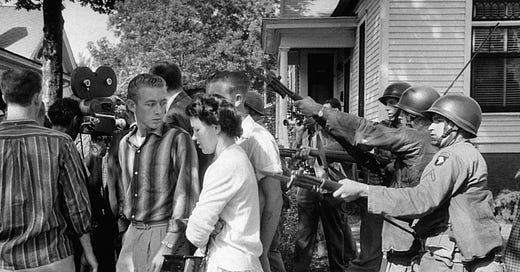





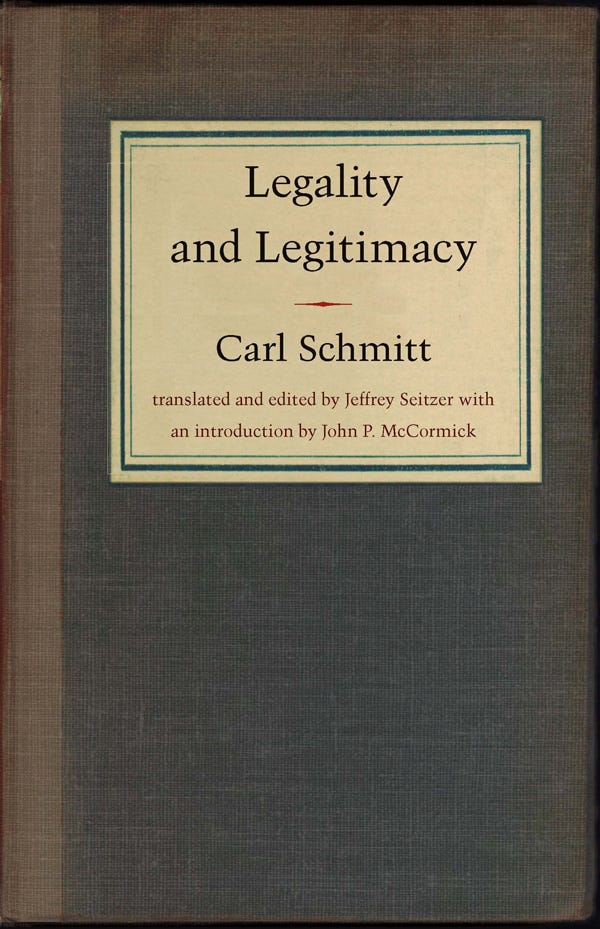
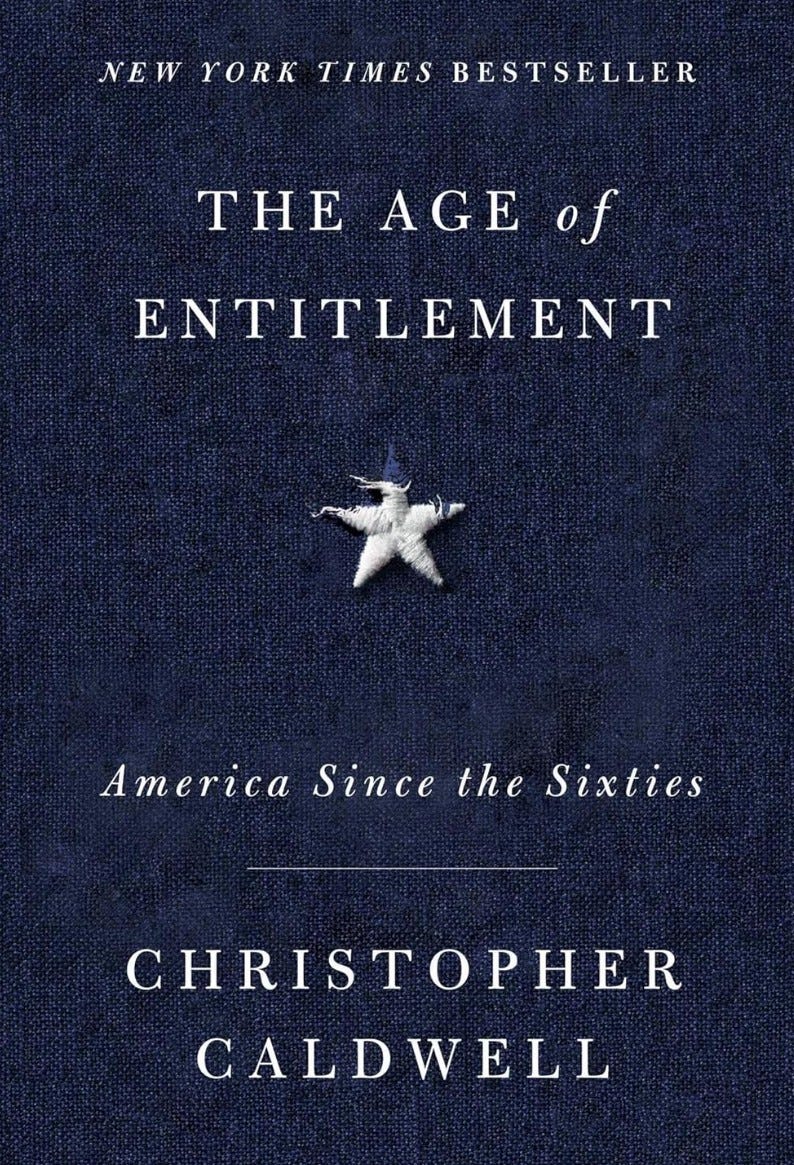
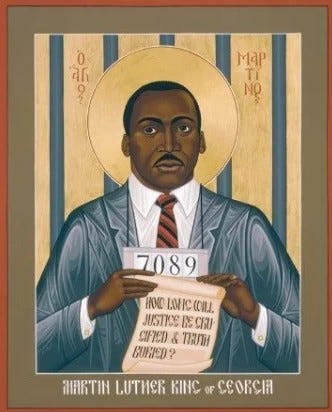
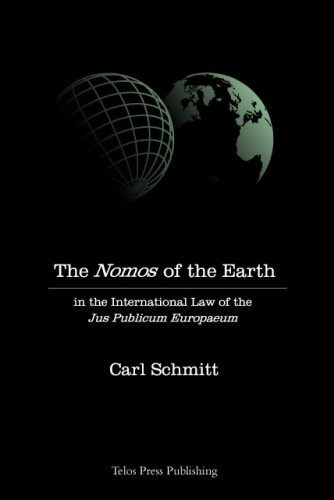
“It cannot last”
Of course it can. We’ve already come perilously close to an era where dissent of any meaningful size was impossible. If current artificial intelligence trends continue there is zero reason to believe that a future where untiring algorithms censor every form of communication and manipulate the human mind towards progressive ends forever is anything close to impossible.
Excellent analysis, it would be appropriate to name the perpetrators of this fatal development...